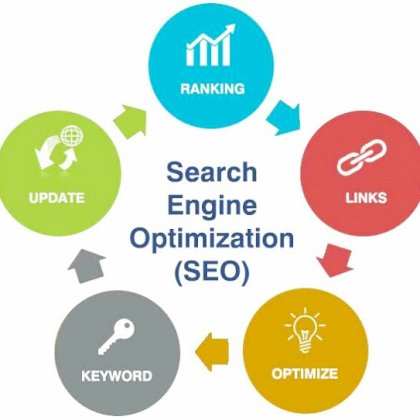Get Familiar With AdWords Keyword Planner and Its Functionality

adwords keyword planner The AdWords Keyword Planner is a powerful tool offered by Google that helps advertisers and marketers identify relevant keywords for their ad campaigns. With this tool, users can enter any keyword or phrase and gain insights into its search volume, competition level, and potential cost per click. This information assists users in making informed decisions about their ad placements and budget allocations. Moreover, the Keyword Planner provides suggestions for similar keywords, allowing advertisers to explore other related terms that may attract more relevant traffic. By utilizing this tool effectively, businesses can optimize their ad campaigns and reach their target audience more efficiently.
When it comes to optimizing your website for search engines, one of the most crucial aspects is keyword research. Without proper keyword targeting, your online presence might struggle to gain visibility. That’s where AdWords Keyword Planner comes into play. In this article, we will delve into what AdWords Keyword Planner is and how it can work wonders for your website.
AdWords Keyword Planner is an indispensable tool provided by Google that helps you discover relevant keywords for your online advertising campaigns. By using this tool effectively, you can identify the most suitable keywords that align with your business goals.
The process of using AdWords Keyword Planner is simple yet extremely powerful. It starts by entering a keyword or a set of keywords related to your business or industry. The tool then generates a list of keyword suggestions along with useful metrics and data.
One of the key features of AdWords Keyword Planner is the ability to refine your keyword searches based on various criteria. You can specify your targeting preferences regarding language, geographical location, search volume, and even competition level. This allows you to narrow down your keyword selection to optimize your campaign's success.
Furthermore, AdWords Keyword Planner provides essential information like average monthly search volume and competition level for each suggested keyword. This data is crucial for determining keyword effectiveness and potential impact on your advertising campaign.
When using AdWords Keyword Planner, keep in mind the importance of selecting the right keywords and using them naturally throughout your content. Overusing keywords or stuffing them unnecessarily could have an adverse effect on your website's performance and search engine rankings. Ensure that your content flows smoothly and provides value to your readers.
In conclusion, AdWords Keyword Planner is a vital tool for SEO enthusiasts and digital marketers alike. Through thorough keyword research and analysis, you can easily unlock the potential of your online advertising campaigns. Remember to utilize this tool effectively, keeping in mind essential SEO guidelines and Neil Patel's distinctive writing style. By doing so, you will significantly impact your website's visibility and ultimately drive more traffic and conversions.
The Benefits of Using AdWords Keyword Planner for Keyword Research
Keyword research is a crucial step in any search engine optimization (SEO) strategy. It helps businesses identify the right keywords to target, increase organic traffic, and ultimately drive conversions. One of the most effective tools for conducting keyword research is the AdWords Keyword Planner.
AdWords Keyword Planner is a free tool provided by Google. It allows users to find relevant keywords and get insights to create targeted ads. However, the benefits of using AdWords Keyword Planner go beyond just paid advertising. Here are some key advantages:
- Discover High-Performing Keywords: With AdWords Keyword Planner, you can identify keywords with high search volumes and low competition. This helps you choose the most valuable keywords to optimize your website content, blog posts, and other marketing materials.
- Understand Search Intent: AdWords Keyword Planner provides information about search volume, competition, and trends for keywords. This data helps you understand the intent behind the searches and align your content with what users are looking for.
- Refine Your Keyword Strategy: AdWords Keyword Planner allows you to expand your keyword list and discover new keyword ideas. You can filter keywords based on location, language, and other criteria relevant to your target audience. This helps you refine your keyword strategy and reach the right audience.
- Plan Your Advertising Budget: AdWords Keyword Planner provides estimated bid ranges and average monthly search volumes. This data helps you plan your advertising budget and make informed decisions about bidding on specific keywords.
- Optimize Your Website Content: By using AdWords Keyword Planner, you can optimize your website content with relevant keywords. This improves your website's visibility in search engine results and drives organic traffic.
In conclusion, AdWords Keyword Planner is an invaluable tool for keyword research. It empowers businesses to discover high-performing keywords, understand search intent, refine their keyword strategy, plan their advertising budget, and optimize their website content. By using this tool effectively, businesses can maximize their online presence and drive targeted traffic. Start leveraging AdWords Keyword Planner today and see the positive impact it can have on your SEO efforts.
Step-by-Step Guide: How to Use AdWords Keyword Planner for Effective Keyword Research
As an SEO professional, one of the most important tools in your arsenal is the AdWords Keyword Planner. This powerful tool allows you to identify and research the keywords that can drive targeted traffic to your website. In this step-by-step guide, we will walk you through the process of using the AdWords Keyword Planner for effective keyword research.
Before we dive into the details, let's understand the importance of keyword research. Keywords are the foundation of any successful SEO strategy. They help search engines understand the content and purpose of your web pages. By targeting the right keywords, you can attract the right audience and increase your chances of ranking higher in search engine results.
Why Use AdWords Keyword Planner?
AdWords Keyword Planner is an essential tool for keyword research because it provides valuable insights into search volumes, competition, and suggested bids for keywords. This information can help you make informed decisions about which keywords to target and how to optimize your campaigns for maximum impact.
Now, let's walk through the step-by-step process of using AdWords Keyword Planner:
Step 1: Access AdWords Keyword Planner
To access AdWords Keyword Planner, you need to have an active AdWords account. If you don't have one, you can sign up for free. Once you have logged in to your AdWords account, click on the "Tools" tab and select "Keyword Planner" from the drop-down menu.
Step 2: Discover New Keywords
Click on the "Discover new keywords" option in the Keyword Planner dashboard. Here, you can either enter a few seed keywords related to your business or website or enter your website URL to generate keyword ideas based on your content. The Keyword Planner will provide you with a list of relevant keywords along with useful data such as average monthly searches, competition level, and suggested bid.
Step 3: Refine Your Keyword List
Review the list of suggested keywords and filter them based on relevancy, search volume, and competition. Look for keywords that have a decent search volume and low competition. These keywords are more likely to bring targeted traffic to your website without facing tough competition from other websites.
It is also important to consider the intent behind keywords. Look for keywords that align with the purpose and content of your website. For example, if you offer digital marketing services, target keywords like "digital marketing agency" or "SEO services" rather than generic terms like "marketing" or "services."
Step 4: Analyze Keyword Trends
Keyword trends can provide valuable insights into the seasonality of search terms. Use the "Get search volume and trends" option in the Keyword Planner to analyze the search volume trends for your selected keywords over a specific time period. This information can help you optimize your campaigns and content based on the changing search behavior of your target audience.
Step 5: Plan Your Ad Campaign
Once you have finalized your keyword list, it's time to plan your ad campaign. Use the "Get click and conversion estimates" option in the Keyword Planner to estimate the potential clicks, impressions, and conversions for your selected keywords. This information can help you set realistic goals for your ad campaign and allocate your budget effectively.
Conclusion
The AdWords Keyword Planner is an invaluable tool for effective keyword research. By following the step-by-step process outlined in this guide, you can identify and target the right keywords to drive targeted traffic to your website. Remember, keyword research is an ongoing process, and it's important to regularly analyze and refine your keyword strategy to stay ahead of the competition.
Tips and Techniques to Optimize Your Keyword Selection with AdWords Keyword Planner
Keyword selection plays a crucial role in the success of your SEO efforts. By choosing the right keywords, you can attract targeted traffic to your website and increase your chances of ranking higher in search engine results. One of the most effective tools for keyword research is the AdWords Keyword Planner. In this article, we will discuss some tips and techniques to optimize your keyword selection using this powerful tool.
Firstly, it's important to understand the purpose of the AdWords Keyword Planner. This tool allows you to explore keyword ideas and gather data on their performance. It provides valuable insights into search volumes and trends, as well as competition levels. By utilizing this information, you can identify high-performing keywords and make informed decisions for your SEO strategy.
When using the AdWords Keyword Planner, it's essential to focus on relevance. You want to target keywords that are directly related to your website or business. Avoid using generic or broad keywords that may attract irrelevant traffic. Instead, aim for specific keywords that align with your niche. By doing so, you can attract qualified leads and increase your chances of conversion.
Another important aspect to consider is keyword competition. The AdWords Keyword Planner provides a metric called "competition" that indicates how difficult it is to rank for a particular keyword. Ideally, you want to target keywords with moderate to low competition. This means that fewer websites are actively optimizing for those keywords, giving you a better chance of ranking higher in search results.
Furthermore, it's crucial to analyze search volume trends. The AdWords Keyword Planner provides historical data on search volumes, allowing you to identify seasonal trends or fluctuations. By understanding these patterns, you can optimize your content strategy to align with peak search periods and maximize your visibility.
In addition to the AdWords Keyword Planner, it's also beneficial to conduct competitor analysis. By analyzing your competitors' chosen keywords and their performance, you can gain valuable insights into effective keyword selection strategies. This competitive intelligence can help you refine your own keyword selection and identify new opportunities.
Lastly, always monitor and evaluate the performance of your chosen keywords. Use analytics tools to track the traffic and conversions generated by each keyword. Continuously optimize your keyword selection based on data-driven insights, and adapt your SEO strategy accordingly.
In conclusion, optimizing your keyword selection is a critical aspect of effective SEO. By using the AdWords Keyword Planner and following these tips and techniques, you can uncover valuable keywords, attract targeted traffic, and increase your chances of ranking higher in search engine results. Stay updated with the latest keyword trends and continuously adapt your strategy to ensure long-term success.
Common FAQs and Troubleshooting Tips for Using AdWords Keyword Planner
Are you struggling to make the most out of AdWords Keyword Planner? Do you find yourself encountering the same issues over and over again? Look no further! This article aims to provide you with the most commonly asked questions about AdWords Keyword Planner and troubleshooting tips to help you overcome any hurdles you may face.
What is AdWords Keyword Planner?
AdWords Keyword Planner is a powerful tool provided by Google that allows you to research and analyze keywords for your advertising campaigns. It assists you in finding relevant keywords, estimating their search volumes, and providing insights on bid estimates for your chosen keywords.
How do I access AdWords Keyword Planner?
To access AdWords Keyword Planner, follow these simple steps:
- Sign in to your Google Ads account.
- Click on the "Tools & Settings" option, located in the top menu.
- Select "Keyword Planner" from the dropdown menu.
Can I use AdWords Keyword Planner for free?
Yes, AdWords Keyword Planner is available for free to everyone. However, keep in mind that some features, such as historical statistics and more detailed keyword suggestions, may require an active Google Ads campaign.
Why is my search volume showing as zero?
If you are seeing zero search volume for your keywords, there could be a few reasons:
- Your location and language settings might not match your target audience.
- Your keyword may be too specific or have very low search volume.
- There may be an issue with the data provided by Google.
To resolve this issue, try broadening your keyword selection or adjusting your location and language settings.
How accurate is the search volume data?
The search volume data provided by AdWords Keyword Planner should be taken as an estimate rather than an exact count. It is based on historical data and trends, and there might be some fluctuations in the actual search volume.
What are some best practices for using AdWords Keyword Planner?
Here are some tips to make the most out of AdWords Keyword Planner:
- Start with broad keyword ideas and use the tool to refine them.
- Regularly review and update your keyword list based on the tool's suggestions.
- Utilize the filtering options to narrow down your keyword selection.
- Consider the competition level and bid estimates when choosing keywords.
In conclusion
AdWords Keyword Planner is a valuable tool that can significantly enhance your keyword research efforts. By understanding its features and implementing the best practices mentioned above, you can maximize the potential of your AdWords campaigns and drive meaningful results.
For more information on AdWords Keyword Planner, check out https://ads.google.com/home/tools/keyword-planner/.
Frequently Asked Questions
The AdWords Keyword Planner is a tool provided by Google for advertisers to research and analyze keywords for their ad campaigns. It helps advertisers find the most relevant and effective keywords to target their desired audience.
To access the AdWords Keyword Planner, you need to have an active Google Ads account. You can then sign in to your account, navigate to the Tools & Settings menu, and select Keyword Planner from the available options.
The AdWords Keyword Planner provides information such as search volume data, keyword suggestions, historical statistics, and estimated bid amounts for keywords. It also allows you to create new keyword ideas based on your website, product, or service.
Yes, you can use the AdWords Keyword Planner without running ads. It can be used for keyword research and planning even if you are not actively running ad campaigns.
Yes, the AdWords Keyword Planner is free to use. However, you need to have an active Google Ads account to access the tool.
Yes, the AdWords Keyword Planner allows you to target specific geographic locations. You can choose to refine your keyword suggestions and search volume data based on location settings.
The search volume data provided by the AdWords Keyword Planner is an estimate based on historical data. The actual search volumes may vary over time.
Yes, you can download the keyword suggestions from the AdWords Keyword Planner. You have the option to export the keyword ideas as a CSV file for further analysis.
Yes, the AdWords Keyword Planner is available in multiple languages. You can choose your preferred language settings when accessing the tool.
While the AdWords Keyword Planner is primarily designed for paid advertising, it can also be used for SEO purposes. It provides valuable insights into keyword popularity and competition, which can help optimize your website's organic search strategy.
 English
English
 Turkish
Turkish 






















